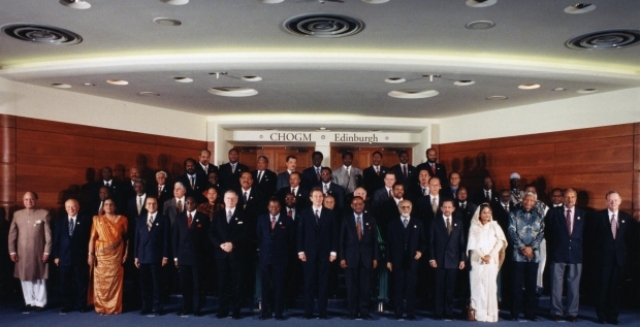 "Then, as now, issues around Europe and the possibilities of the Commonwealth trade and investment preoccupied British policy makers and civil servants at the summit" [Photo: ComSec Flikr]
"Then, as now, issues around Europe and the possibilities of the Commonwealth trade and investment preoccupied British policy makers and civil servants at the summit" [Photo: ComSec Flikr]
As Britain prepares to host the Commonwealth summit next month, the Institute of Commonwealth Studies and the Oral History Programme at King’s College, London, organised a meeting this week between leading British figures and senior Commonwealth diplomats to discuss the last occasion on which Britain hosted such a meeting.
The purpose behind this meeting was three-fold:
- in these days of rapid political change and multiple international challenges, much is made of the value of institutional memory across Whitehall as a key ingredient in managing these multiple pressures. (Interestingly, the current FCO team did not get an initial background briefing from their highly capable predecessors). The Commonwealth itself has experienced considerable change in terms of its organisational capacity (the reformed Secretariat now has approximately 150 staff), so the Secretariat’s own ‘memory’ is very largely short-term.
- Secondly, it represented a unique study in summitry and diplomacy around a unique multi-lateral association.
- Thirdly, it provided an extraordinary snapshot of New Labour in government, and practical issues around foreign policy presentation and management.
Speakers included Sir John Holmes GCVO, KBE, CMG (then Principal Private Secretary to the Prime Minister), Mr Martin Hatfull (then Head, Commonwealth Coordinating Department, FCO), Ms Anji Hunter, Private Assistant to Prime Minister Tony Blair, Mr Stuart Mole, OBE (then Director and Head of the Office of the Commonwealth Secretary General, Chief Emeka Anyaoku); Mr Amitav Banerji (then Deputy Conference Secretary, Commonwealth Secretariat) and Ms Prunella Scarlett LVO (Then Director, Commonwealth Affairs, Royal Commonwealth Society).
The animated discussion covered a wide range of issues in the run-up to the Edinburgh head’s meeting, the summit itself, and its perceived impact and aftermath. Topics ranged from the challenges for the FCO team’s preparations for a large multi-lateral meeting as a general election loomed, and the strong likelihood of a change of government, key personalities and logistics: the attitude and input of Prime Minister John Major, who had been determined to dispel the hangover of the bruising memory of battles within the Commonwealth over British policy to apartheid South Africa; the charisma and energy of a new Labour government, under Tony Blair, with no foreign policy ‘baggage’ and very little understanding of, or prior contact with the modern Commonwealth. Speakers emphasised the importance of context of the heavy schedule of hosting other multi-lateral meetings (the G-8), Britain’s impending assumption of the EU Presidency and the inevitable heavy pressures on a Prime Minister’s diary, with consequent limited ability to focus. There were wry reminiscences of problems around the curtailed retreat in St Andrews.
Then, as now, issues around Europe and the possibilities of the Commonwealth trade and investment preoccupied British policy makers and civil servants at the summit. At any Commonwealth summit, the host is particularly conscious of domestic politics and influenced by these tensions: in Edinburgh, Blair was acutely distracted by his government’s stance on EMU, and tensions within his Cabinet around this key issue. He was also determined to run things at a brisk pace. This clearly disconcerted a number of older heads, who were unaccustomed to discussions being run at such a clip. Mandela and his ‘star dust’ was discussed (including his provocative views on where Lockerbie bombers should be tried) – the importance of visibility of a Commonwealth meeting overall, and the limited attention span of the mainstream and tabloid press.
Although British hopes soon dissipated over a lasting impact for the Edinburgh Economic Declaration, it was clear Tony Blair and his officials realised possible benefits around Commonwealth meetings: it was the first time the Prime Minister had met Commonwealth heads, 20 of whom were newly elected; and what clearly counted were the ‘bilaterals’ in the margins of a large summit meeting, rather than in the large executive sessions.
The Witness seminar also underlined the presence of the NGOs and the energy and input of their activities across the city – that the summit was not just viewed holistically by the new Labour government in its management of foreign policy and high level meetings in its first 6 months of office, but also the Commonwealth heads’ gathering ‘in the round’ well beyond the executive discussions in the conference centre.
Contributors referred to the place and role of the Queen at the meeting, and the debate over new members. Last, and not least, the importance of the successful summit meeting to the city of Edinburgh was acknowledged: to help soothe the sour memory of hosting the ‘Unfriendly Games’ (the 1987 Commonwealth Games had been boycotted by over 30 African countries), and the city had been left with substantial debts.
[The full approved transcript of the Witness Seminar will be made available later this year on the Round Table website.]
Sue Onslow is the acting Director of the Institute of Commonwealth Studies and a member of the Round Table Journal’s Editorial Board.



